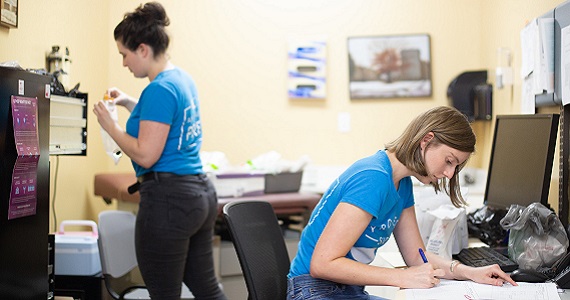How to Become a Preceptor for a Public Health Student

The Drexel University Dornsife School of Public Health (DSPH) partners with community organizations to build the future public health workforce and support our students’ preparedness to improve population health.
Serving as a preceptor provides students with invaluable opportunities to integrate their classroom learning with hands-on experience while widening the scope of their professional networks as they embark on a meaningful career in the field of public health.
The experience is rewarding for preceptors as well, since many find our students’ work to be an essential piece that improves public health in Philadelphia and beyond.
What is a Preceptor in Public Health?
The Applied Practical Experience (APE) – also commonly referred to as a practicum – is a community-based experience completed by all MPH students as part of their course requirements.
All APEs are supervised by a preceptor. A preceptor is someone who has work experience in the public health field and the capability to provide instruction for the tasks that the student is expected to complete as part of their APE. The preceptor serves as the supervisor of the practicum or internship.
What Do You Do in a Preceptorship?
The preceptor determines the project tasks, deliverables, and weekly schedule for the APE in collaboration with the student.
Preceptors meet at least bi-weekly with students to provide guidance and oversight. They do not assign a grade, but they review deliverables and provide feedback.
DSPH preceptors come from all sectors of public health and other industries, providing exposure to a variety of skills and tasks relevant to students’ future careers.
Review our preceptor requirements and orientation materials (PDF).
What Are the Benefits of Being a Preceptor?
The benefits of being a public health preceptor include:
- Help teach individuals who are eager to enter the public health field
- Give back by sharing unique knowledge and experiences with students completing their APEs
- Create or solidify a connection with Drexel University and the Dornsife School of Public Health
What Qualities Make a Good Preceptor?
Qualities for a good public health preceptor include:
- Good communication skills and willingness to mentor
- Knowledge of your organization and industry
- Availability to meet bi-weekly and provide feedback
How Long is the Preceptorship?
While there is not a minimum hours requirement for the APE, most of our MPH students complete at least 120 hours. APEs occur over the course of a term (10 weeks).
Beginning of APE: Students are expected to develop a learning agreement, which is submitted to the preceptor and faculty mentor for review and signature.
APEs occur at any point during late March through mid-September for most students, but it may vary by program and plan of study.
End of APE: As part of the APE, students are expected to create and submit two products that demonstrate their MPH skill level. These deliverables are submitted to their preceptor and faculty mentor.
Preceptor Requirements
To be a preceptor, one must have at least one of the following:
- A master’s degree and one year of public health work experience
- A bachelor’s degree and three years of public health work experience
Dornsife alumni are welcomed and encouraged to serve as preceptors.
Preceptor Responsibilities & Opportunities
Selecting your student: Preceptors may conduct the selection process as they see fit. While some conduct in-person or phone interviews with each applicant, others only invite a few to interview. Learn more about how students find their APE.
Supervising your student: Preceptors are expected to sign off on the student’s learning agreement, develop the tasks and project responsibilities of the student, and provide instruction and supervision.
A preceptor should take time to:
- Orient the student to the organization and introduce them to key staff.
- Supervise student work and provide regular feedback.
- Meet at least bi-weekly with the student to ensure satisfactory progress is being made.
- Complete a midpoint and final evaluation of student performance and experience working with DSPH.
- Communicate with DSPH faculty and staff to assist if challenges arise.
Preceptors are encouraged to consider the financial obligations that full-time students have related to their schooling and to provide compensation if possible, although this is not required.
How to Become a Public Health Preceptor
DSPH preceptors provide mentorship and support to our students that is vital to their learning and growth as public health professionals. Here are the steps to becoming a public health preceptor:
- Develop a practicum opportunity
- Submit the project to be posted on Symplicity, which is our school-wide portal of job postings
- Review student applications
- Schedule interviews
- Work with your selected student to onboard them and supervise tasks
Learn more in the DSPH preceptor requirements slide show.
Post a Position on Symplicity
Sign in to Symplicity
If you have more questions about becoming a preceptor please reach out to Tariem Burroughs.